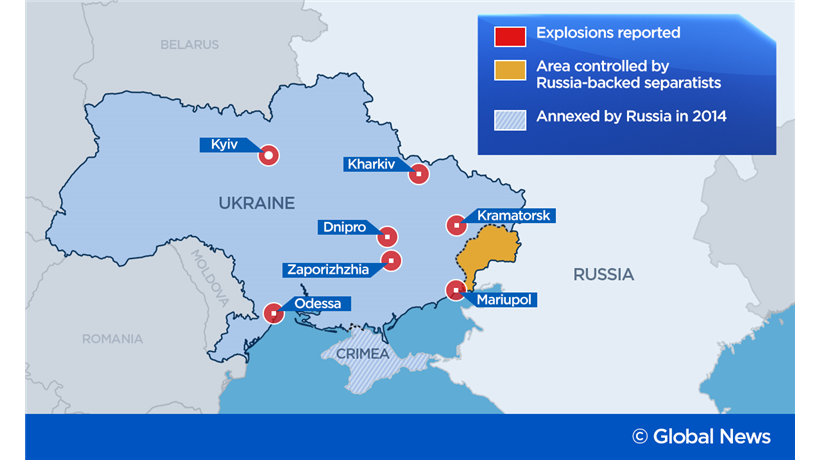As residents of the Ukrainian capital of Kyiv fled around him, Darren Snow went out for coffee.

Mere hours after Russian President Vladimir Putin defied international pressure and launched a wide-ranging attack on Ukraine, Snow, a Canadian expat from Vancouver, B.C., was resolute in his decision to stand his ground in Kyiv.
When asked if he would take up arms to fight alongside the Ukrainians, he told Global News: “Well, where do I get them?”
Snow is one of hundreds of Canadians who remain in Ukraine following missile strikes across the country launched by Putin early Thursday, local time.
Live – World reacts as Russia invades Ukraine
At least 40 people have been killed and dozens were wounded by the Russian shelling, an adviser to the Ukrainian presidential office said. He did not specify if any of the dead were civilians.
Global Affairs Canada, which since January has warned against non-essential travel to Ukraine, on Thursday updated its advice for Canadians who remain, urging people to “shelter in place unless it is safe for you to leave the country.”
“The security conditions are deteriorating rapidly,” a notice on the Global Affairs website reads.
“Our ability to provide consular services in Ukraine may become severely limited. You should not depend on the Government of Canada to help you leave the country.”
In a statement on Wednesday, Global Affairs Canada said there are approximately 800 Canadians registered with the Registration of Canadians Abroad service in Ukraine.
'I heard something like a cruise missile... over the house'
Ukrainian President Volodymyr Zelenskyy has declared martial law and appealed for help fighting “the aggressor” from world leaders and even his own citizens, promising weapons to anyone in the country who needed them.
Snow, who moved to Kyiv eight years ago to work in IT, says he “kind of has to” answer that call. Snow says he has not yet left the country, despite evacuation orders, because he has two children there whom he shares with his Ukrainian ex-wife.
His 25-year-old son, who lives in Canada, is also currently visiting him in Kyiv and cannot find an easy way out of the country.
Snow says he awoke to calls on Thursday from friends and family soon after shelling across the country began.
“I got my first phone call at 5.30 a.m. this morning and then I heard something like a cruise missile going right over the house,” he says.
Many people he knows had chosen to evacuate the capital for Lviv, in western Ukraine near the Polish border. However, he says considering how widespread the missile strikes have been, he feels just as safe in Kyiv as he would elsewhere.
So on Thursday afternoon, as lines of traffic poured out of the city, Snow went to a cafe with his son near his house. While many of the smaller shops were closed, he says the cafes near him remain open as others also resolve to stay in Kyiv.
Canadians evacuate Ukrainian cities
Meanwhile, other Canadians Global News spoke to had decided to flee the country or evacuate to its west.
Jack Linton, who had arrived in Ukraine about four weeks ago from Oakville, Ont., and who was staying in Kyiv, has booked a train to Lviv for Friday evening. He’s planning on reassessing the situation from there.
Linton, like others, had remained in Ukraine despite warnings from Global Affairs Canada because the threat of war seemed distant.

Global News spoke to almost a dozen Canadians still in Ukraine earlier this week, all but one of whom had then decided to stay put. Some referenced difficulty uprooting lives and families, while others spoke of the calm atmosphere in the country and said it seemed unlikely a full-scale war would break out. However, most said they had an emergency plan and would leave if fighting became more widespread.
On Thursday, Linton told Global News he had moved apartments to stay with an American expat closer to the city centre and both were leaving on Friday together.
“There’s not really such an easy way out right now so I pretty much have to wait until tomorrow. … Until then, I’m stuck here still,” he says.
Others had fled Lviv and were sheltering in villages on the Polish border, ready to attempt to cross into Poland on Friday.

Expat groups in Ukraine are now full of messages from people in neighbouring countries offering to take in refugees fleeing the country.
Michael Lahoda, from Brantford, Ont., is attempting to do the same.
Lahoda left his home in Kyiv in February as the situation deteriorated, first heading to Lviv for a month and then 10 days ago moving to Antalya, Turkey, where his company relocated employees and their families to “decompress and destress.”
The employees were supposed to be returning to Kyiv on Feb. 28, which was now off the table.
Lahoda says he is now trying to help people in Ukraine from afar, opening up a couple of the apartments he owns in Lviv to friends and family.
“We are doing everything we can from where we are to make sure everyone’s as safe as possible — opening up our homes, sharing information, making donations, monitoring the situation and suggesting movement patterns to help people avoid danger.”






Comments